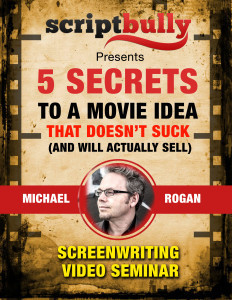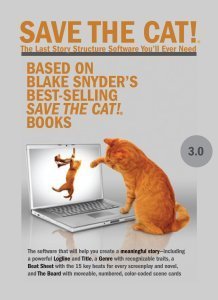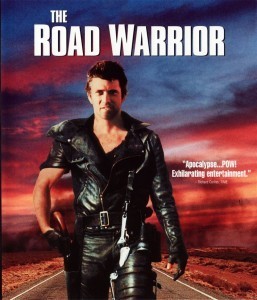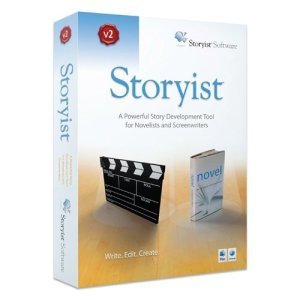Michael Rogan's Blog, page 8
January 9, 2015
Screenwriting Hack: 4 Tips to Come Up With a Screenplay Title That Doesn’t Suck

In this installment of Screenwriting Hacks, we tackle that most elusive and strange concept: how do you come up with a title for your screenplay.
I’m not a good person.
I know this because not only do I constantly judge a book by its cover – and in these self publishing times that can tell you a lot – but 97.5% of the time I decide whether to see a movie based solely on its…
Title.
Not the trailer. (Those can be very deceptive.) Or the poster. (That tells me nothing.) Or the stars. (Unless Scarlett Johansson is starring.)
Nope, for me, it’s all about the title. So, I KNOW titles are important.
But many screenwriters think they need to WAIT to start writing until they have a title. Or aren’t sure even HOW to come up with a halfway decent title for their script.
So, here is a super-simple guide to creating a killer screenplay title:
 Screenplay Title That Doesn’t Suck Tip #1: Name It Anything (It’ll Probably Change Anyway)
Screenplay Title That Doesn’t Suck Tip #1: Name It Anything (It’ll Probably Change Anyway)
Titles are ALMOST always a marketing decision, after months of focus groups, development meetings, and overpriced lattes.
The examples are numerous but here are a couple of faves:
The original title for “Annie Hall” was “Anhedonia.” (Describe people who are clinically unable to be happy.)
Original title for “Halloween” was “The Babysitter Murders.”
Original title for “The Great Gatsby” – in what might be the WORST original title ever – was “Trimalchio at West Egg.”
And, in each of these cases, I would say, the movie was IMPROVED by the title change.
So, whatever you do, don’t WAIT till you find the perfect title before writing. (There’s little chance it’ll stay by the end.)
Screenplay Title That Doesn’t Suck Tip #2: Avoid Genre Norms
…that being said: having a good title can really help. Especially with queries and getting people interested in your script.
I can tell you, as a former script reader, I was always more jazzed by a title that seemed fresh and non-cliche. (Which might influence my coverage.)
And one of the quickest ways I know how to do this is to take your script genre’s accepted title format…and spin it on its ear.
For instance:
If you’re writing a thriller, avoid anything involving “heat” or condition that can be described as “fatal,” “sudden,” or “final.”
If you’re writing a comedy, avoid titles with song lyrics and cliched expressions. (They’ve all been used. There’s nothing new.)
If you’re writing a horror movie, try to avoid – if you can – anything filled with “terror,” “blood,” or “horror.” (Awww…but what fun is that?
Okay, so I’ve told you what you can’t do. How about what you can do.

Screenplay titles work best when they evoke a word.
Screenplay Title That Doesn’t Suck Tip #3: Evoke a World (or Group of People)
It could be just me, but I love titles that evoke a place. (Whether physical or psychological.) Or a group of specific people.
Doesn’t matter what genre; I think fixing your story to some “otherworld” or “insider group” is exciting for the reader/viewer – and doesn’t come off as cheesy. It can work for:
Thriller – “Shutter Island”
Romance – “The Bridges of Madison County”
Comedy – “Bridesmaids
Note: Directors love scripts with place titles. Means they get to shoot on location.

Going strange or funny with your screenplay titles is always a good gamble.
Screenplay Title That Doesn’t Suck Tip #4: When in Doubt, Be Funny (or Crazy)
And if you don’t know what to do…then just go all-out and be as weird or funny or wild as you can be.
My favorite example of this, and a script I actually got to read in development, was “American Pie.”
The original title for this script, when it circulated around town, was “Untitled Teenage Sex Comedy We Know They’ll Never Make.”
How cool is that? (Wish the movie was half as cool as that title.)
Another great example is the underground script “Van Damme vs. Segal” which is about, you guessed it, a feud between Steven Segal and Jean Claude Van Damme.
By naming your script with a offbeat/funny title you give development folks a chance to brag about the scripts they read to their colleagues. And who knows…they just might like what they see enough to write you a check that will cure even the worst case of Anhedonia.
October 10, 2014
What’s the Best Story Software for Screenwriters?

(In this edition of Screenwriting Software & Tools Q & A we answer a question about story development software…)
Hey ScriptBully,
So, I know you recommend getting screenwriting software, such as Final Draft or Movie Magic. But I just wanted to know your thoughts about other forms of screenwriting software. Such as Dramatica or Contour or Story Unlimited.
Do you think screenwriters SHOULD use story software like that – or not worry about it?
James
Orlando, Florida
Hey James,
Great question. I know it’s tempting to wanna run out and grab the newest/latest form of store development/screenwriting software that will help you unlock the key to a killer Act II or a smash-bang opening.
But…I think there’s one word in your question that troubles me.
Should.
The word, should presumes you NEED software in order to tell your story.
I hate to break it to you: but there’s no magic elixir in any of those forms of story software.
They are all just elegant visual storyboards to help you “see” your story. If you’re able to do that with a couple of index cards from Staples, or a piece from scratch paper from the bottom of your desk drawer…then you DON’T have to use story software.
But…that being said…here are some 3 screeenwriting story software solutions I like:
 Save the Cat Story Structure Software
Save the Cat Story Structure Software
Chances are you’ve probably read the book “Save the Cat” – the influential book from the dearly departed Blake Snyder. And this software really makes it easy to apply the timeliess story strategies to help you achieve a well-organized script in no time.
The only downside is that the story structure is a bit rigid – this will be a pro for some, a con for others. But overall a great product to add to your storytelling arsenal.
Highly Recommended – Great for Newbies and Veterans Alike
So, this isn’t technically for screenwriting and is mostly created with novelists in mind. But i find the interface to easy to use – even for a right-brainer like me – and so visually welcoming that I like to lay out all my plots, subplots, character descriptions, setting notes, and overall research with this program.
Recommended – Great for all storytellers. Not technically for screenwriters.
Now, those are the two biggies that I use – but there are some other story software products that do specific things. Such as Persona, which helps you create characters. Or Inspiration, which helps with brainstorming. .
Or Outline 4D which helps you…well…outline.
But no matter which story software you choose to go with, remember the best story generating tool you have is the one between your ears.
Got a screenwriting software recommendation? Please let us know in the comments below!
Screenplay Format Tricks: How to Introduce a Character in Your Screenplay

In this edition of Screenplay Format Tricks, we go over that most strange and awkward task: introducing characters in a screenplay.
You’ve gone through all the character-building exercises. Your secondary characters are as developed as your primary characters—they ooze personality, character development, quirks, and pizazz.
You feel like you know them, you know what they dreamt about last night, you know how they take their coffee, you know their biggest fears, weaknesses, strengths, and whether their belly button is an outie or an innie.
Most of this information will never reach the page, but it’s important that you, as the writer, know all the ins and outs of each character. And you do!
So you’re ready to write, but how do you first introduce this character onto the page? What is the correct script format for introducing characters?
It’s actually pretty simple and shouldn’t take long to master—the main rule for correct screenplay format of a character introduction is that the first time the character appears in the script, you must put their name in all CAPS.
EXT. AMUSEMENT PARK – DAY
A bearded man, RAY, in a “Save the Whales” T-shirt tinkers with water gun behind his carnival game booth as a crowd of visitors walk by ignoring his stand.
RAY
Guaranteed Winner! $1 per game! Moms and Dads, challenge your offspring!
If the character doesn’t have a name and instead is referred to as “Waitress” or “Spectator 1”, you still need to put their name in all CAPS the first time they appear in the screenplay.
If the character is simply mentioned in speech, you don’t need to put their name in all CAPS. Only put the name in all CAPS when they physically appear in the story.
To keep things simple and avoid confusion, it’s best to name your characters when they first appear in the screenplay—don’t call the woman “WAITRESS” on page 12 and then give her a real name on page 22, name them right away.
And remember, the first time you name the character in your screenplay is a good chance to offer a little insight into that character’s personality and nature.
Don’t get too specific unless the specifics matter to the plot, but use this chance to give your reader an idea of who this character will be. Follow the above tips and you’ll have correct script format for introducing characters.
Got a screenplay format question? Let us know in the comments below!
October 15, 2013
Screenwriting Hack: Screw You, Writer’s Block

The only thing harder than WRITING…
…is NOT writing.
I’ve learned this firsthand, as I’ve battled a months-long bout of…
…Grade-A, Top-Shelf, Primo, First-Class Writer’s Block.
And I know it’s been awhile since we’ve chatted. (Many of you reached out to me to ask if I was okay.)
If I was still alive.
If I had been absconded by ninjas hired by Michael Bay...and held in an underground bunker, miles below the planet surface.
WISH it was that cool.
Truth is, and I’ve shared this with a few people, the past few months I’ve been caring full-time for my terminally-ill mom battling Stage 4 Liver Cancer.
Which is hard enough on its own. (I feel for anybody who’s gone through that. Cancer is a bastard.)
And I was prepared for the emotional roller coaster.
And the sleepless nights.
And the hours spent in doctor’s offices and Kaiser pharmacy lines…
…and that horrible, dread feeling that you DON’T have control over anything. (Hard for OCD, control-freaks like me.)
What I wasn’t prepared for was…writer’s block.
No, worse than writer’s block.
Writer’s dread.
That whole questioning: “What’s the point of writing?”
I mean, we spend all these hours slaving over our script pages, and for what…?
So, we can MAYBE have somebody validate our talent by purchasing the script.
And then MAYBE have some sociopathic studio head turn our story into an action-figure marketing funnel.
And then MAYBE, if it actually gets released, we can have some apathetic audience members, too distracted by their cell phone, to actually be moved by our story.
Like I said, writer’s dread.

I tried every NLP, Zen Buddhist TRICK in the book.
I bribed myself with tortilla chips and Trader Joe’s salsa.
I promised to LET myself watch Vampire Diaries. (Again.)
I chained myself to my Office Depot ergonomic chair if I could only break through resistance or karma or inertia or my profound laziness or my bipolar ADD-inflicted brain…
…and JUST write something!
And every time I tried to write a new scene, or write you guys a new rant about the film business…I just froze.
I just couldn’t see an end game. A POINT to all this mental and physical effort.
And as my mom’s illness took a turn for the worse, I had the notion to blow off this whole ScriptBully thing, and say, “You know what scripty-types…
“It’s been fun. But I don’t think I have anything more to say.”
And that’s what I would have done, if not for one of the last conversations I had with my mom before she passed away.
I asked her, looking back on her life, if she would have done anything differently. (You know, besides NOT marry my father.)
And that’s when she asked me to find a small black box hidden in the back of her closet.
Inside that box was a letter, dated March 4, 1954, which informed her she had been accepted into a San Francisco art school.
And underneath the letter was an unused one-way Amtrak Train ticket from San Diego Union Station to downtown San Francisco.
I was shocked. I had no idea my mom had gotten into art school. Or was even that interested in painting.
But instead of jumping on that train — and starting a whole new creative, Bohemian life — she let her parents talk her into doing something more practical.

So she went to secretary school. She learned shorthand. And typing. And Toastmistress.
And became an executive assistant at San Diego Gas and Electric.
But the creative part of herself kept that train ticket, and her dream of being an artist, in a small black box near the back of her closet.
She told me her only regret was NOT getting on that train.
And that’s when I realized the point of art or creativity or writing is not to sell a screenplay or become famous or make lots of money or write the best damn screenplay ever.
It is simply to get ON the train.
To go WHERE the journey of writing takes you.
And find out where, and who, you’ll end up being at the end.
Carl Jung once said: “Nothing has a stronger influence on a child than the unlived life of a parent.”
And I firmly believe that.
I think my whole drive behind ScriptBully has been to inspire and motivate you to take a chance on yourself, and your talent, to see what kick-ass, magical places you might end up.
It’s a lesson, though, that I could use myself from time to time.
And one I hope you’ll take to heart, long before you put away that train ticket in the back of the closet.
[Do you have a story about writer’s block or creative adversity? I’d love to hear about in the comments!]
August 12, 2013
Screenwriting Hack: How to Write a Movie Script That Hollywood Will Actually Buy

Learning how to write a movie script is one thing…learning how to write a movie script that people will actually pay you hard currency for.
In this video, I share 6 tips to planning, structuring, and writing a screenplay that is guaranteed to not suck…and MAY just give you a boost in its chances to get sold. (And get your screenwriting career started.
June 19, 2013
Script Writing 101: How to Find the Best (Worst) Hero for Your Screenplay
In this edition of Script Writing 101 we’re going to About 15 years ago I optioned a screenplay I had written.
And I was 97.3% certain it was going to make me wealthy, famous, and the object of some Ukranian supermodel’s affection.

And this script was a GUARANTEED winner.“Optioning” a script, for those in need of a refresher, is where strang ers give you a little bit of money to see if other, more powerful strangers will give you a lot more money.
It had a great romantic comedy concept. (Easiest genre to sell.)
It had a series of visual, comedic setpieces that would make for one very funny trailer.
It had a boffo opening scene that would have been talked about for generations to come.
And I was went around “town” pitching this story I was certain would provide for me and future Rogan generations my confidence was sky high.
Until a wizened old producer met me for lunch and explained to me that my script had a SLIGHT FLAW.
“Your main character sucks.”
What?
But that can’t be.
I had to explain to him that the main character was quirky and had a weird backstory and she wore offbeat Annie Hall-inspired clothes and she’d be the perfect vehicle for an up-and-coming actress.
The producer just shook his head and said something I’ll never forget:
“Good stories aren’t about the stuff that happens. It’s about finding a hero who has the FARTHEST TO GO to learn the lesson.”
Oh…
See, what he meant by my “character sucks” was that my heroine went from moderately depressed to cautiously happy.
She was quirky, yes, but she was also passive, timid, and reactive.
She didn’t walk into a scene demanding the world adjust to her. She was flexible. (To a fault.)
And while reserved, slightly passive characters can make for great leads – Tender Mercies and Remains of the Day are a couple of films that come to mind – it is a subtle art best left to the masters. (Not somebody cranking out their third screenplay.)
Worst of all, it was a fatal flaw. Something I couldn’t simply change in the rewrite.
Like betting on the wrong horse, once you’ve staked things to the WRONG CHARACTER you are pretty much screwed.
 The error was so glaring because the character who had the FARTHEST TO GO in my screenplay was the MOTHER CHARACTER.
The error was so glaring because the character who had the FARTHEST TO GO in my screenplay was the MOTHER CHARACTER.
I had given all the energy, power, obsession to the WRONG CHARACTER. (And had my lead react off of this in funny, sarcastic ways.)
So…today’s QUICK TIP is a simple, but profound one that can really change the trajectory of your script.
Simply look at your story, hopefully before you type FADE OUT and ask yourself WHO HAS THE FARTHEST TO GO to learn the lesson.
If you find it’s ANOTHER CHARACTER in your story, then ask yourself what would the script look like from their point of view.
Maybe you’re shying away from the character who can really open things up for you.
As J.M. Barrie (author of Peter Pan) said:
The life of every man is a diary in which he means to write one story, and writes another.”
Sometimes the story writes us. Not the other way around. (And hopefully you realize that before you sit ina producer’s waiting room.)
The post Script Writing 101: How to Find the Best (Worst) Hero for Your Screenplay appeared first on How to Write a Screenplay That Doesn't Suck.
June 12, 2013
Script Writing 101: How to Keep Your Screenplay Characters From Being Garden Gnomes
In this edition of Script Writing 101 we cover the mysterious, stange and bizarre question of what the hell to do with characters who don’t have any lines in a scene.

My old production company boss used to call them garden gnomes. Screenplay lawn furniture.
Characters who would just float in a scene. Characters who would sit there, taking up space and oxygen on the page.
Sitting. Observing. Doing nothing at all.
And while Joss Whedon may be able to pull off a situation like that — The Avengers has a lot of scenes where characters just sit there talking — most of us need a little more screenwriting sleight-of-hand to pull something like that off.
So, here are 3 tips on how to make sure your screenplay is garden gnome-free….and your scenes are full of engaging and interesting characters. (Even if they aren’t talking.)
Tip No.1: Go From Wide to Tight to Wide Aagain
No matter how many characters you have in a scene, you will generally want to focus your scene on one specific relationship.
And whether your scene is at a baseball game or tatoo convention you can easily show the reader/viewer where the focus should be starting the scene in a wide shot…
The House That Ruth Built. Upper Deck. Where the corporate sponsors don’t make it.
…and then gradually let the description get tighter. (And then provide a natural close up.)
JIMMY and TOMMY, friends for as long as anybody on 53rd Street can remember, argue over the last packet of mustard.
…and then after they have their big fight, or whatever, you can PULL BACK for another wide shot to include other characters.
Jimmy hits Tommy. Tommy kicks Jimmy. The entire Section 32 roars in approval. Except for a MAN IN A SUIT, who carefully scribbles into a small, leather notebook.
Tip #2: Let Your Supporting Characters Fight Over the Main Action of a Scene
As I said, most of your scenes will be about one character having an objective and then crashing into another character or opponent who thwarts that objective.
 But what do you do if you HAVE to have them in the same room. (Such as for a Thanksgiving dinner.)
But what do you do if you HAVE to have them in the same room. (Such as for a Thanksgiving dinner.)
Well, one easy way is to have the supporting characters is to a) take sides and b) creat their own mini-version of the main conflict of a scene.
Ensemble comedies do this really well. Check out films like “Meet the Parents” or “Father of the Bride” or anything by Judd Apatow.
And you will see a main conflict going on between two characters.
but then the supporting characters seem to either be commenting about the main character’s argument…or having their own weird, twisted argument. (Judd Apatow does this marvelously. Usually with all those slacker friends who permeate his work.)
Don’t forget though…the supporting characters should comment and riff and reflect the emotional intensity of the main conflict. (The stakes should NOT be more important.)
Tip #3: Map Out Your Scenes With Action Figures
Okay, so you may not have a ton of action figures lying around. (Like I do.)
But the next time you’re at some discount retairler, pick up a couple of off-brand figures and add them to your screenwriting arsenal.
Because one of the best ways to “map out” those big, family scenes where people are sitting around and not much is going on physically…is to line up some action figures and just see what the scene looks like.
Watch a film like “12 Angry Men” to see this done brilliantly. This entire film is shot in ONE ROOM. But notice how the characters keep moving. They go to the window. THey walk up to the clock on the wall.
They stand up. They sit down. They pace.
They move.
Because movement connotes action. It connotes emotion.
And without action or emotion, all we’ve got are a couple of garden gnomes clogging our screenplays.
The post Script Writing 101: How to Keep Your Screenplay Characters From Being Garden Gnomes appeared first on How to Write a Screenplay That Doesn't Suck.
December 31, 2012
3 Reasons Why 2013 Will Be Your Best Writing Year Ever

In this blog post I will cover:
Why this is the BEST TIME EVER to try to break in the film business
What the box office results of 2012 tell us about what scripts will sell in 2013
How the efforts of one famous movie studio affect your career
“Should Old Acquaintance Be Forgot”
I’ve got a friend who works in development for a major movie studio.
He’s got a cool job, makes a ton of cash, drives an amazing car, and spends most of his weekends reading crappy scripts by middle-aged professional screenwriters who used to work on staff for Nash Bridges and , but gave up giving a shit what they wrote about years ago.
So I’m on the phone with him the other day. Partially, because I wanted to get an invite to his New Year’s party. (The amount of cosmetic surgery on display at that affair is astounding.)
The other: to get his thoughts on the state of the business.
Me: So, how are things looking for 2013?
Him: Lousy.
Me: Oh. You mean for writers.
Him: Hell, no! For me. For writers, this is the best time EVER for an unknown to BREAK IN. And that scares the crap out of EVERYBODY in this building.
So here’s my top 3 reasons why 2013 is gonna be the YEAR you break through and sell that script…
#1-The (Distribution) King is Dead, Long Live the King
 Remember that scene in The Road Warrior, when a slightly less bipolar Mel Gibson fought bands of outlaws in a post-apocalytpic desert for the precious, scarce resource of gas.
Remember that scene in The Road Warrior, when a slightly less bipolar Mel Gibson fought bands of outlaws in a post-apocalytpic desert for the precious, scarce resource of gas.
That’s exactly what the entertainment industry is like right now.
Only the scarce resource is viewer eyeballs.
And nobody knows where the hell they can find them anymore.
Because:
People don’t watch commercials anymore (unless it’s sports)
People don’t go to the movie theatre nearly as much (when they can stream Netflix or steal the movie off BitTorrent)
People are even watching movies less and less on their big-screen TV anymore
Which means, “if you build it, and they come…” then you can make a hell of a lot of money right now.
So if you can prove that your script or concept will attract eyeballs…
…it DOES NOT MATTER if it’s based on a personal blog, Youtube channel, self published book an Amazon, twitter following, reality show, the back of a matchbox, written on the wall in grafitti….
You can get it made. Now!
#2-Rise of the Movies That Don’t Blow Shit Up
Couple months back I got a text from a guy I know who works in movie financing. It was just five words, but they might have been the best five most encouraging words a newbie screenwriter could ever hear.
 “Battleship is officially a flop”
“Battleship is officially a flop”
That’s because if there were any movie that was designed and manufactured to make money, Battleship was it.
It had built-in brand equity. It had that crappy Michael Bay Transformers feel.
It had Alexander Skarsgard and that unfairly beautiful Brooklyn Decker.
Unfortunatley it just didn’t have a story.
Conversely, small films made for adults who aren’t on Ritalin and need stuff to blow up eveyr three seconds, such as Lincoln; Life of Pi; Moonrise Kingdom; The Exotic Margigold Hotel; Argo — have done really well.
And tentpole action films are usually written by professional screenwriter who the studios trust.
But adult dramas, independent dramedies—these come writers on the outside of the system.
Writers like you.
#3- Even Disney is Making Movies (Sort of)
There’s a joke in the film industry.
 That Disney produces really amazing merchandising, that have feature film tie-ins.
That Disney produces really amazing merchandising, that have feature film tie-ins.
That is Disney makes movies, to sell action figures and lunchboxes and fill theme park passes.
They don’t make movies to just make movies.
And they hardly make movies at all, lately.
Except things are starting to open up.
And if Disney, the most conservative and risk-averse studio EVER, is starting to open up the development purse strings that can only mean one thing….
The (movie) economy is in much, much better shape than it was four years ago.
Combine that with the turbulent creative environment of Hollywood, and you find yourself, as a screenwriter just like Mel Gibson in the Road Warrior…
Holding the gas that everybody wants.
The post 3 Reasons Why 2013 Will Be Your Best Writing Year Ever appeared first on How to Write a Screenplay That Doesn't Suck.
December 27, 2012
Protected: Highlights
This post is password protected. To view it please enter your password below:
Password:
The post Protected: Highlights appeared first on How to Write a Screenplay That Doesn't Suck.
October 10, 2012
How Unsolved Murders in the South of England Saved My Mom’s Life
(Note: Mom’s feeling much better. Thanks everybody for the kind words!)
Daytime television at the Palomar Medical Center in San Marcos, California isn’t very good.
I know this because I have spent the past week and a half here, watching as my mom recovered from a serious emergency surgery, and an even more serious and problematic recovery.
In between the morphine and the post-op complications and the chronic “A-Fib”, the one constant in room 412 has been the mounted television blaring all sorts of televised nonsense.
(Did you know there are seven different shows featuring a “retired” judge dispensing homespun justice? That’s a lot of justice.)
For days nothing seemed to raise my mom’s spirits beyond an almost, inaudible groan.
Nothing that is, except for the exploits of a certain WWII police detective in the South Coast of England who can’t drive.
“What You Both Need is a Jolly Good Murder”
Besides shopping, there’s nothing my mom loves more than British drawing-room mysteries.
And so when I found out I could route my computer into her hospital TV—thank God for aux cables—I decided to head to the library for some much needed diversion.
Problem was, she had seen most everything: Cadfael, Touch of Frost, Prime Suspect, Inspector Lewis, Agatha Christie…everything!, Luther, Dalziel and Pascoe, etc.
 But there in the back, next to the educational DVD’s teaching people how to prepare their taxes were five season of Foyle’s War….
But there in the back, next to the educational DVD’s teaching people how to prepare their taxes were five season of Foyle’s War….
…an English series starring the wonderful Michael Kitchen as a widowed (and somewhat retired) chief constable who must oversee the many murders (and there are quite a few) that plague the town of Hastings during the years of the Second World War.
Perhaps it’s because it was a period piece; born in 1937, the Second World War would remind my mom of her childhood.
Or maybe it was the fact that it was something to watch besides game shows and Everyone Loves Raymond reruns.
But something about those characters. Something about that gray, overcast lanscape. Something about those freakishly frequent murders in that small English town that cut through the pain, the narcotics, and the fear of not knowing what the future holds to capture my mom’s imagination.
And when something captures our imagination, there’s not much that can stand in the way.
“Funny Thing About War, Christopher…”
So…what the hell does this have to do with your script?
Everything.
I’m not claiming that Anthony Horowitz was trying to change the world when he created Foyle’s War; maybe he was just trying to pay off his castle in the Somerset countryside.
But he changed my mom’s world. And he certainly changed mine.
The power stories have isn’t just to entertain. Sometimes they can act as a balm for a broken heart.
 A catalyst for personal change.
A catalyst for personal change.
A reminder that we have great power in us. (Even if it’s just the will to live.)
So next time you’re feeling frustrated by the writing process, or feeling blocked about what to write, or just figuring it’s okay to “take the night off” from writing…don’t.
We need your stories. More than you’ll ever know.
And someday, I hope to buy Mr. Horowitz buy a pint at his favorite public house. (I hope he’s a lager guy. That would be super cool.)
But until then, I’ll just have to show my thanks by encouraging the next crop of great young writers—that’s you!—to keep writing.
No matter what.
The post How Unsolved Murders in the South of England Saved My Mom’s Life appeared first on How to Write a Screenplay That Doesn't Suck.

 Storyist 2 Software
Storyist 2 Software




